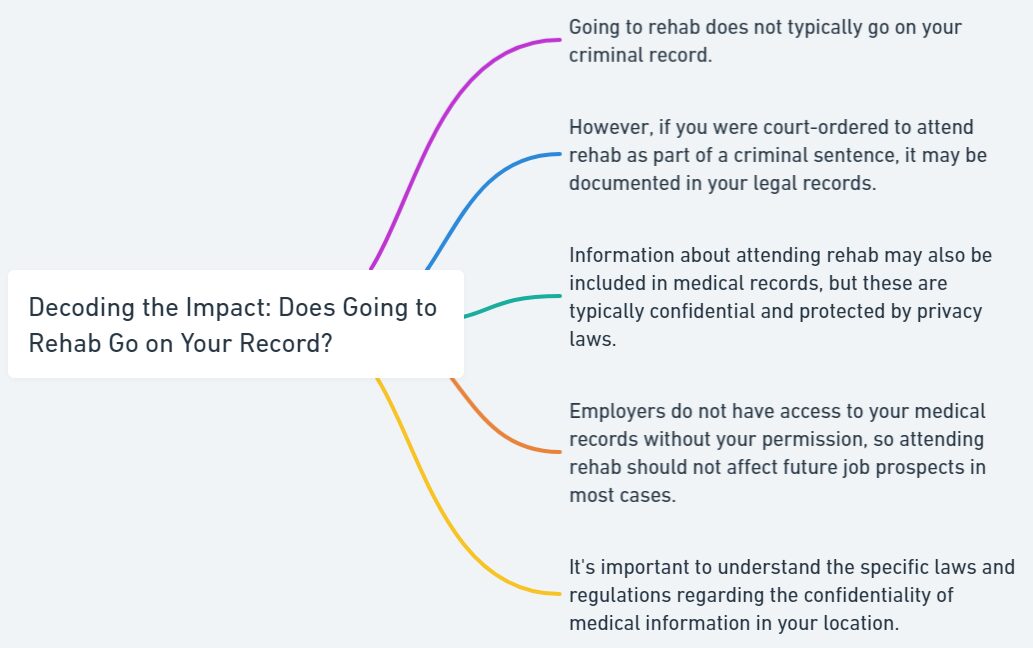Entering rehab can be a life-changing decision for those struggling with addiction. But what about the potential ramifications on your personal record? Does going to rehab go on your record, and is attending rehab something that will follow you forever? In this blog post, we’ll discuss the impact of rehab on your record, the privacy laws that protect you, and how to navigate life after rehab with confidence.
Key Takeaways
- Understanding rehab confidentiality and associated privacy laws is essential to protect treatment information.
- HIPAA protects the privacy of drug and alcohol rehab patients, while background checks typically do not include details regarding rehabilitation stays.
- Familiarizing yourself with workplace resources can help ensure a successful transition back to work post-rehab.
Understanding Rehab Confidentiality and Your Record
Confidentiality in addiction treatment holds immense significance, facilitating the treatment process for individuals. Privacy laws, such as the Health Insurance Portability and Accountability Act (HIPAA) and 42 CFR Part 2, play a crucial role in protecting your rehab privacy and ensuring that your treatment information does not end up on your permanent record.
We will now examine these regulations and their role in safeguarding your rehab information.
The Role of HIPAA in Protecting Your Rehab Privacy
HIPAA is a federal law that safeguards the continuity of healthcare coverage and restricts the use and disclosure of drug abuse patient records for substance abuse disorder treatment providers, including those under the mental health services administration. It ensures that all information shared between healthcare providers and drug or alcohol rehab patients is kept private and secure. HIPAA promotes treatment seeking by ensuring the confidentiality of your medical records and other health information, thus preventing misuse of your information.
The HIPAA Privacy Rule, along with 42 CFR Part 2, offers robust protection for your rehab records. Consequently, without your explicit consent, your rehab facility is prohibited from revealing your treatment information to your family, friends, or employer. In certain situations, such as when there is a risk of imminent harm or indication of child abuse, confidentiality may be breached, but these instances are rare and strictly regulated.

Rehab Information Under Legal Scrutiny
While your rehab information is generally protected, there are certain legal situations that may require the disclosure of your rehab records. For example, a court order in a criminal case involving child abuse might mandate the release of your rehab information.
In most scenarios, the confidentiality of rehab records is maintained, thereby ensuring that your rehab stay doesn’t reflect on your criminal record. This privacy protection allows you to focus on your recovery journey without worrying about the potential impact on your personal and professional life.
However, in some cases going to rehab can actually positively impact the outcome of your legal case by showing commitment to self improvement and personal development. For more information on this, read our article on going to rehab before court date and how it can help your legal case.
Clarifying What Shows Up on Background Checks

A common apprehension pertaining to rehab is the potential visibility of treatment records on background checks. Thankfully, background checks generally do not include details related to rehabilitation, thanks to privacy regulations like HIPAA and 42 CFR Part 2.
Hence, it is improbable that your rehab stay will influence future job prospects or other life aspects requiring a background check.
Types of Background Checks: What They Include and Exclude
There are various types of background checks, such as:
- Identity verification
- Criminal background checks
- Credit background checks
- Professional license & education background checks
While these checks may reveal information about your criminal history, credit standing, and professional credentials, they typically do not include details about your rehab stays.
Keeping rehab information off background checks guarantees that your past treatment won’t obstruct your future endeavors.
Navigating Employment After Rehab: Your Rights and Protections

The prospect of returning to work post-rehab can be intimidating. Nonetheless, it’s imperative to be aware of your rights and protections designed to facilitate a smooth work transition and prevent discrimination stemming from your past substance abuse treatment. These protections are provided by laws like the Americans with Disabilities Act (ADA) and the Family Medical Leave Act (FMLA).
Understanding the Americans with Disabilities Act (ADA) and Its Impact
The ADA is a vital piece of legislation that protects individuals who have completed rehab from discrimination. It recognizes addiction as a disability and prohibits employers from discriminating against any person who is sober or actively pursuing sobriety. This protection ensures that you can secure and maintain employment without being unfairly judged based on your past treatment.
The Family Medical Leave Act (FMLA) and Substance Abuse Treatment
FMLA is another important law that allows employees to take job-protected leave for drug and alcohol rehab, including substance abuse treatment and alcohol treatment. It not only ensures job security while you attend rehab but also maintains the confidentiality of your medical information.
Leveraging FMLA allows you to concentrate on your recovery, alleviating concerns about job loss or exposure of your treatment information.
Ensuring Confidentiality: Selecting a Drug Rehab Treatment Plan

While selecting the addiction treatment program, it is crucial to prioritize a rehab facility like Lantana Recovery that has a robust commitment to privacy. This will help ensure the confidentiality of your treatment and records, allowing you to focus on your recovery without the added stress of worrying about who might find out about your rehab stay. It’s important to seek treatment in a secure environment that respects your privacy, and many individuals find themselves seeking treatment for the first time with this in mind.
Evaluating a Rehab Facility’s Commitment to Privacy
To assess a rehab facility’s commitment to privacy, you can:
- Review their privacy policies
- Inquire about any confidentiality measures they have in place
- Ensure that the facility adheres to federal regulations like HIPAA and 42 CFR Part 2, which provide robust protection for rehab records.
Opting for health care providers that uphold privacy and comply with these regulations ensures the confidentiality and security of your personal health information.
If you are concerned about the financial aspect of going to rehab, read our article on drug and alcohol rehab cost to familiarize yourself the various factors that can impact the cost of rehab and the ways you can fund your addiction treatment.
The Intersection of Medical Records and Privacy Laws
The overlap of medical records and privacy laws safeguards your rehab information, with federal regulations such as HIPAA and 42 CFR Part 2 serving as a robust shield for your treatment records. These laws not only ensure the confidentiality of your rehab stay but also protect you from potential discrimination and negative consequences related to your treatment.
How Federal Regulations Shield Your Treatment Records
Federal regulations, such as HIPAA and 42 CFR Part 2, offer robust protection for your rehab records. They ensure your treatment information remains confidential and secure by:
- Requiring written consent for any disclosure of protected records
- Stipulating that the information disclosed is safeguarded by federal law
- Prohibiting further disclosure without authorization
With these regulations in place, you can have peace of mind knowing that your rehab records are protected.
The Journey Ahead: Preparing for Life Post-Rehab
Preparing for life post-rehab involves comprehending your rights and protections, and formulating a plan for a successful transition back to work and everyday life. By being proactive and taking advantage of the available resources, you can maintain your privacy while focusing on your ongoing recovery.
Some steps to ensure a smooth transition include familiarizing yourself with your workplace’s employee assistance programs (EAP) and understanding the ADA and FMLA protections available to you. Embracing these measures enables a confident return to your job, with the assurance of protected privacy and rights.
Summary
In conclusion, attending rehab does not have to negatively impact your personal record. Privacy laws, such as HIPAA and 42 CFR Part 2, provide robust protection for your rehab information, ensuring confidentiality and preventing discrimination. Understanding your rights and protections, as well as selecting a rehab facility with a strong commitment to privacy, will allow you to focus on recovery and successfully transition back to work and daily life without worrying about the potential consequences associated with your treatment.
Frequently Asked Questions
Is alcoholism protected under Hipaa?
HIPAA does protect alcoholism, as it prohibits medical providers from disclosing any information to non-treatment entities. Therefore, disclosing the fact that someone has been engaging in risky drinking behavior will remain confidential.
Will attending rehab impact my personal record?
Attending rehab will not impact your personal record due to privacy laws like HIPAA and 42 CFR Part 2.
What rights do I have when returning to work after rehab?
You have rights and protections under the ADA and FMLA when returning to work after rehab, ensuring that you are treated fairly and receive the necessary accommodations for your needs.



